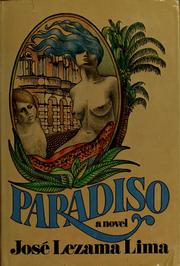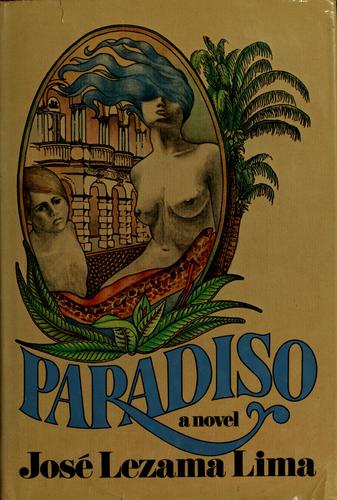Check nearby libraries
Buy this book

"A classic of modern literature, Paradiso was first published in Cuba in 1966. Written by Cuba's most important poet, it tells the story of Jose Cemi, who, in the wake of his father's death, comes of age in turn-of-the-century Cuba. Weaving the exhilarations and defeats of love into extraordinarily erotic verbal tapestries, Lezama Lima narrates Cemi's search for his dead father and for an understanding of love and the powers of the mind."--BOOK JACKET.
Check nearby libraries
Buy this book

Previews available in: English
Subjects
Fathers, Death, Fiction, LGBTQ novels before Stonewall, Fiction, general, Romance literaturePeople
José Lezama LimaShowing 3 featured editions. View all 41 editions?
| Edition | Availability |
|---|---|
| 1 |
cccc
Libraries near you:
WorldCat
|
| 2 |
aaaa
Libraries near you:
WorldCat
|
| 3 |
cccc
Libraries near you:
WorldCat
|
Book Details
Edition Notes
Classifications
The Physical Object
ID Numbers
Source records
Internet Archive item recordOpenLibraries-Trent-MARCs record
Library of Congress MARC record
amazon.com record
Better World Books record
marc_columbia MARC record
Work Description
Paradiso is a novel by Cuban writer José Lezama Lima, the only one completed and published during his lifetime. Written in an elaborately baroque style, the narrative follows the childhood and youth of José Cemí, and depicts many scenes which resonate with Lezama's own life as a young poet in Havana. Many of the characters reappear in Lezama's posthumous novel Oppiano Licario, which was published in Mexico in 1977.
The novel relates Cemí's struggles with a mysterious childhood illness, describes the death of his father, and explores his homosexuality and literary sensibilities. He lives in the world of pre-Castro Havana, and the Cuban Revolution only appears as a secondary plot. Some of the later chapters incorporate narrative experiments in which several alternating stories, set during widely divergent eras and having no immediately apparent connection with José Cemí, are interwoven and eventually merged. (In a letter to Julio Cortázar, Lezama explained that these chapters represent Cemí's dreams after the death of his father.) Because of the graphic homosexual scenes and the novel's ambivalence towards the political situation of the day, Paradiso encountered controversy and publication problems. Today it is widely read in the Spanish-speaking world but has not achieved the same fame in English-speaking countries despite a translation by Gregory Rabassa.
Despite having written one of the most accomplished novels in Cuba's history, Lezama said he never considered himself a novelist, but rather a poet who wrote a poem that became a novel. Paradiso can thus be considered a kind of long poem, just as well as a neo-baroque novel.
Community Reviews (0)
Feedback?| September 11, 2023 | Edited by Erraticonteuse | Edited without comment. |
| November 17, 2022 | Edited by ImportBot | import existing book |
| November 5, 2021 | Edited by Jenner | Added new cover |
| November 2, 2021 | Edited by ImportBot | import existing book |
| December 9, 2009 | Created by WorkBot | add works page |















